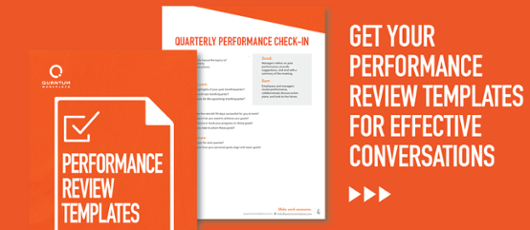What Not to Say in a Performance Review: Tips for Managers
 Performance reviews are tough for your employees.
Performance reviews are tough for your employees.
While good performance conversations breed transparent communication, employee development, and healthy relationships—bad ones spell disaster for employee performance and engagement.
Whether employee reviews are yearly, monthly, or part of a more comprehensive feedback system, take our advice. Don’t let your managers say these things in their performance reviews.
What Not to Say in a Performance Review
Lets highlight performance review phrases and comments to avoid. Remember: You want your employees to leave the meeting with a clear understanding of what they did well and how they can improve.
Here are a few things you should not say during your next one-on-one:
"Can we make this quick? I’ve got a 10 a.m. meeting."
Make sure you leave ample time for the review. Having to cut an employee performance review before both sides are finished means one side feels cheated and unimportant.
"I think you’re doing this work exactly as I would—great job!"
This comment very clearly compares the employee to the boss. This is a dangerous standard to create. Incentivizing "yes-men and women" and stifling independent thinking will restrict creativity and problem-solving in the future.
"You crushed the other sales reps this year…absolutely destroyed."
Comparing an employee to the manager is a no-no, and so is comparing coworkers (especially team members). No one likes to be held up against their neighbor, and frankly, it only produces resentment and jealousy among colleagues.
While encouraging some healthy office competition is okay, when it comes to performance review comments, leave other people out of it. You’re only reviewing one person’s accomplishments—so stick to those, and help them understand what they can do better. Measure employees against their own past performance.
"You’re a good employee. A very good employee."
This is way too vague. A "good employee"? What’s that supposed to mean? Strive to use detailed words and phrases to explain exactly what the employee did well.
"I’ve got no feedback for you—you did great!"
Every employee has things they’ve done well and things they need to improve upon. Not preparing both positive and constructive feedback communicates to your employee that you haven’t paid attention. Even the best employees expect to hear something they need to do better—otherwise, they’ll start to look for development opportunities elsewhere.
"I can’t believe you consider this work to be acceptable!"
This comment strikes an emotional chord. The manager is clearly upset, and it will only be natural for the employee to respond with the same. The result is two very upset coworkers and zero constructive criticism.
"I heard you handled the X [presentation, meeting] very poorly, and I have to say, I’m disappointed."
In this case, the manager was not able to observe the employee’s performance first-hand. Instead, their performance (or lack thereof) traveled through the grapevine. Peer feedback has a definite place in a performance review, but managers should include specific comments, not office rumors.
Additionally, the manager does not give the employee any opportunity to tell their side of the story. A simple, "How do you think that presentation went?" would have made the conversation more approachable.
"Because of your terrible job on the X [project, case, campaign] you won’t be getting your bonus this year."
Don’t bring up compensation in a performance review—keep the conversations separate. The development of your workforce shouldn’t be overshadowed by what their pay stub is going to read. Combining the two will only make the employee defensive and unwilling to learn.
"You are always late to work."
Words like “never” and “always” just add fuel to a potential fire. No one does something 100% of the time, and acting as such will just leave your employee feeling unfairly put on trial. You can have the same conversation without using those words.
"If you hit the $100,000 mark this year, there’ll be a spot at corporate waiting for you."
Don’t promise, and don’t threaten. In fact, avoid if-then statements altogether. You don’t know where your company or your employee is going to be in six months.
"You’re lucky to get this bonus."
Be happy for your employee, don’t begrudge him. This can only come across as condescending.
Don’t put your performance reviews in jeopardy by saying the wrong thing. Download our free performance review templates so you can ask the right questions, at the right time.







